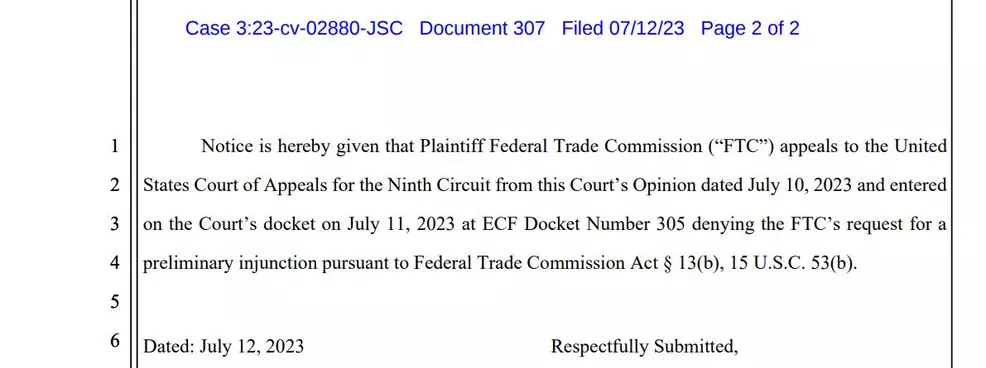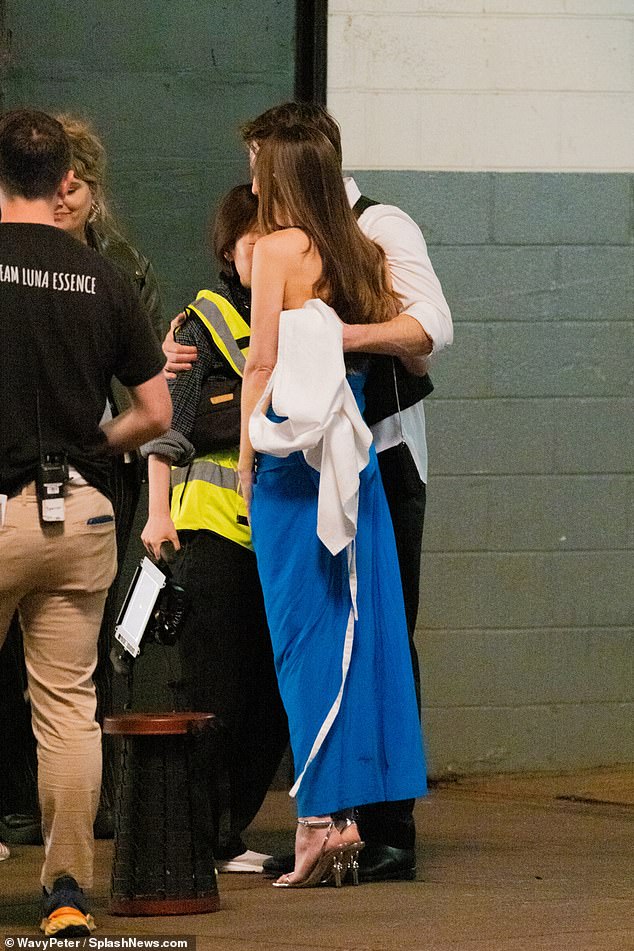FTC Appeals Activision Blizzard Merger Ruling: A Deep Dive

Table of Contents
The FTC's Case Against the Merger
The FTC's core argument centers on the assertion that Microsoft's acquisition of Activision Blizzard would significantly stifle competition and ultimately harm consumers. They contend that this merger grants Microsoft an unfair advantage, potentially leading to anti-competitive practices within the gaming market.
-
Call of Duty Exclusivity: The FTC's primary concern revolves around Call of Duty, a massively popular franchise. They argue that Microsoft could make Call of Duty exclusive to Xbox consoles, severely harming PlayStation users and potentially eliminating a major competitor in the gaming market. This tactic, the FTC claims, would leverage Microsoft's newly acquired market dominance to stifle competition.
-
Broader Industry Consolidation: Beyond Call of Duty, the FTC expresses broader concerns about the consolidation of power within the video game industry. The merger, they argue, would give Microsoft undue influence over game development, pricing, and distribution, potentially leading to reduced innovation and higher prices for consumers.
-
Antitrust Legislation: The FTC's legal challenge is grounded in the Clayton Act and other relevant antitrust laws designed to prevent monopolies and promote fair competition. They believe the merger violates these laws by significantly reducing competition and harming consumers. The FTC's detailed economic models and expert testimony aim to support these claims, presenting compelling evidence of potential harm to the competitive landscape.
The Judge's Ruling and its Rationale
A federal judge dismissed the FTC's lawsuit, allowing the Microsoft-Activision Blizzard merger to proceed. The judge's decision rested on a thorough analysis of the evidence presented by both sides.
-
Key Points of Reasoning: The judge acknowledged the FTC's concerns regarding Call of Duty exclusivity, but found Microsoft's commitment to keeping Call of Duty on PlayStation, through contractual agreements, to be sufficient to mitigate the risk of anti-competitive behavior.
-
Microsoft's Counterarguments: Microsoft successfully countered the FTC’s claims by presenting evidence demonstrating the continued availability of Call of Duty on multiple platforms and emphasizing their commitment to fair competition. They also highlighted the benefits of the merger, such as increased innovation and investment in game development.
-
Legal Precedents: The judge's decision relied on established legal precedents concerning mergers and acquisitions, emphasizing the need to demonstrate substantial harm to competition before blocking a merger.
The FTC's Appeal and its Potential Outcomes
The FTC’s appeal argues the judge erred in dismissing their lawsuit and that the merger poses a significant threat to competition.
-
Legal Arguments for Appeal: The FTC is likely to focus on the potential for future anti-competitive behavior, arguing that Microsoft's contractual agreements regarding Call of Duty are insufficient to guarantee long-term competition. They might also challenge the judge’s interpretation of existing legal precedents.
-
Likelihood of Success: The success of the FTC's appeal is uncertain. Appeals courts often defer to lower court rulings, but the significance of this merger and the potential implications for the gaming industry could influence the appellate court's decision.
-
Potential Consequences: A successful appeal could lead to the merger being blocked entirely, or it might result in the imposition of conditions designed to mitigate anti-competitive risks. These conditions could include limitations on Microsoft's control over Call of Duty or other Activision Blizzard titles. The appeal process could take months, even years, to resolve.
Implications for the Gaming Industry and Beyond
The FTC's appeal carries significant implications far beyond the gaming industry.
-
Impact on Game Development and Distribution: The outcome will shape the future of game development and distribution, impacting how games are created, priced, and made available to consumers. A blocked merger could foster a more competitive gaming market, while its approval could lead to increased consolidation.
-
Future Mergers and Acquisitions: This case sets a crucial precedent for future mergers and acquisitions in the tech sector. Increased regulatory scrutiny is likely following this high-profile appeal.
-
Impact on Consumers: Consumers could see higher prices, less innovation, or a reduction in game availability if the merger is not adequately regulated. Conversely, a more competitive market could benefit consumers with lower prices and more choice.
Conclusion
The FTC's appeal of the Activision Blizzard merger ruling represents a pivotal moment for the gaming industry and antitrust law. The arguments surrounding the potential for anti-competitive behavior, particularly concerning Call of Duty exclusivity, and the broader implications for industry consolidation, are central to this ongoing legal battle. The outcome will profoundly impact the future of the gaming market and set a precedent for future tech mergers. Stay informed about the ongoing legal battle surrounding the FTC’s appeal of the Activision Blizzard merger. Follow the developments to understand the evolving landscape of antitrust regulation and its impact on the gaming industry and beyond. The future of the gaming market may depend on the outcome of this crucial Activision Blizzard merger appeal.

Featured Posts
-
 Kane Double Leads Bayern Munich To Comfortable Win Against Werder Bremen
Apr 25, 2025
Kane Double Leads Bayern Munich To Comfortable Win Against Werder Bremen
Apr 25, 2025 -
 Analiz Zayav Trampa Schodo Viyni V Ukrayini
Apr 25, 2025
Analiz Zayav Trampa Schodo Viyni V Ukrayini
Apr 25, 2025 -
 Focus On Taiwan The Reintroduction Of The International Solidarity Act In The Us Congress
Apr 25, 2025
Focus On Taiwan The Reintroduction Of The International Solidarity Act In The Us Congress
Apr 25, 2025 -
 Detained Palestinian Student Awaits Hearing After Us Citizenship Interview
Apr 25, 2025
Detained Palestinian Student Awaits Hearing After Us Citizenship Interview
Apr 25, 2025 -
 Is Ashton Jeantys Potential Move To The Chicago Bears A Smart Choice
Apr 25, 2025
Is Ashton Jeantys Potential Move To The Chicago Bears A Smart Choice
Apr 25, 2025
Latest Posts
-
 Investing Made Easy Jazz Cash And K Trade Partner For Accessible Stock Trading
May 10, 2025
Investing Made Easy Jazz Cash And K Trade Partner For Accessible Stock Trading
May 10, 2025 -
 Melanie Griffith And Dakota Johnsons Siblings At Materialist Event
May 10, 2025
Melanie Griffith And Dakota Johnsons Siblings At Materialist Event
May 10, 2025 -
 Dakota Johnsons Materialist Premiere Family Outing
May 10, 2025
Dakota Johnsons Materialist Premiere Family Outing
May 10, 2025 -
 Jazz Cash And K Trade A New Era Of Accessible Stock Trading
May 10, 2025
Jazz Cash And K Trade A New Era Of Accessible Stock Trading
May 10, 2025 -
 Melanie Griffith And Siblings Support Dakota Johnson At Materialist
May 10, 2025
Melanie Griffith And Siblings Support Dakota Johnson At Materialist
May 10, 2025
